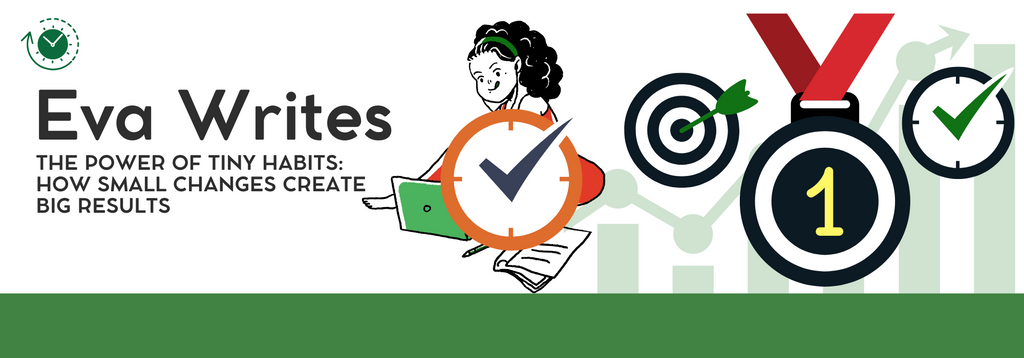The Power of Tiny Habits: How Small Changes Create Big Results

In a world where grand gestures and big plans often steal the spotlight, it’s easy to overlook the transformative power of tiny habits. These seemingly insignificant actions, when repeated consistently, have the potential to create significant and lasting change in our lives. Whether you aim to improve your health, increase productivity, or find more joy in daily living, tiny habits are the secret to making progress without feeling overwhelmed.
Why Tiny Habits Work
Tiny habits are effective because they’re simple and sustainable. Unlike ambitious resolutions that often fizzle out, small actions are easy to integrate into your existing routine. By starting small, you eliminate resistance and build confidence, which naturally encourages bigger changes over time.
- Consistency Over Perfection: Tiny habits thrive on repetition. Even if progress feels slow, small daily steps compound into monumental results.
- Low Effort, High Impact: These habits require minimal time and energy yet pave the way for major transformations.
- No Overwhelm: Focusing on one small change at a time avoids burnout and keeps you motivated.
How to Create Tiny Habits
1. Anchor Habits to Existing Routines
Pair your new habit with something you already do regularly, making it easier to remember.
- Example: After brushing your teeth, floss one tooth.
- Example: While waiting for your coffee to brew, do five squats.
2. Start Small and Build Gradually
Instead of aiming for dramatic changes, focus on the smallest possible step.
- Example: If you want to start exercising, begin with one push-up per day.
- Example: Want to read more? Commit to reading just one paragraph at first.
3. Celebrate Every Win 🎉
Reinforce your efforts by celebrating success, no matter how small.
-
Clap for yourself, say “I’m awesome!” or smile as you complete a habit. Positive reinforcement strengthens the connection in your brain and makes you more likely to continue.
4. Track Progress and Reflect
Use a habit tracker or journal to monitor your consistency. A visual cue of your streak builds momentum and keeps you focused.
-
Seeing steady improvement boosts motivation, even on days when progress feels slow.
5. Use Tiny Habits as Gateways
Small habits act as entry points to larger changes. They naturally grow into bigger behaviors without feeling forced.
-
Example: Flossing one tooth often turns into flossing all of them. A single push-up might lead to a full workout.
Real-Life Examples of Tiny Habits
1. Health Improvements
- Habit: Drink one glass of water immediately after waking up.
- Impact: Starts the day hydrated and leads to improved focus and energy.
2. Productivity Boosts
- Habit: Write down your top priority for the day on a sticky note.
- Impact: Clarifies focus and sets the tone for a productive day.
3. Mental Health Gains
- Habit: List one thing you’re grateful for before bed.
- Impact: Promotes a positive mindset and better sleep.
4. Fitness Improvements
- Habit: Stretch for 30 seconds before stepping into the shower.
- Impact: Increases flexibility and primes your body for movement.
5. Better Relationships
- Habit: Send a quick message of appreciation to a loved one once a day.
- Impact: Strengthens connections and fosters emotional warmth.
The Science Behind Tiny Habits
The brain forms habits by creating neural pathways through repetition. Tiny habits leverage this principle by making the pathway-building process easy and manageable. Over time, the brain shifts the new behavior from deliberate action to automatic routine, freeing up mental energy for other tasks.
BJ Fogg, a behavioral scientist and author of Tiny Habits, highlights three critical components for habit formation:
- Anchor: Attach the habit to something familiar.
- Ability: Simplify the action so it feels effortless.
- Motivation: Celebrate progress to stay inspired.
Overcoming Common Challenges
1. “I Don’t See Results Fast Enough”
Focus on consistency rather than immediate outcomes. Remember, compounding takes time—the progress may be invisible now but becomes undeniable over months.
2. “I Keep Forgetting”
Use triggers like alarms, sticky notes, or habit trackers to remind yourself. Anchoring to existing routines also reduces forgetfulness.
3. “I Feel Unmotivated”
Break the task into an even smaller step. If you can’t run a mile, put on your running shoes—the act of starting often builds momentum.
Conclusion
Tiny habits may seem insignificant on their own, but they carry immense potential for life-changing results. By starting small, staying consistent, and celebrating progress, you can transform your routines and achieve goals without the overwhelm of massive changes. The beauty of tiny habits lies in their ability to seamlessly integrate into your life, setting the stage for compounding growth.
Ready to create positive change, one small step at a time? Discover how tools like the Ultimate Habit Tracker can help you stay on track and turn tiny habits into remarkable outcomes! 🌟
-
Posted in
#Focus, #Growth, #Habits, #Motivation, #Success







